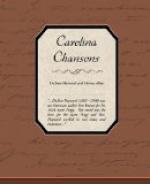I saw him once asleep
Down by the dark ponds
Where alligators creep.
He had been fishing with a
willow withe,
And by him lay his hourglass
and scythe,
Resting upon the grass;
They lay there in the sun,
And through the glass the
sands had ceased to run.
H.A.
DUSK
They tell me she is beautiful,
my City,
That she is colorful and quaint,
alone
Among the cities. But
I, I who have known
Her tenderness, her courage,
and her pity,
Have felt her forces mould
me, mind and bone,
Life after life, up from her
first beginning.
How can I think of her in
wood and stone!
To others she has given of
her beauty,
Her gardens, and her dim,
old, faded ways,
Her laughter, and her happy,
drifting hours,
Glad, spendthrift April, squandering
her flowers,
The sharp, still wonder of
her Autumn days;
Her chimes that shimmer from
St. Michael’s steeple
Across the deep maturity of
June,
Like sunlight slanting over
open water
Under a high, blue, listless
afternoon.
But when the dusk is deep
upon the harbor,
She finds me where
her rivers meet and speak,
And while the constellations
ride the silence
High overhead, her cheek is
on my cheek.
I know her in the thrill behind
the dark
When sleep brims all her silent
thoroughfares.
She is the glamor in the quiet
park
That kindles simple things
like grass and trees.
Wistful and wanton as her
sea-born airs,
Bringer of dim, rich, age-old
memories.
Out on the gloom-deep water,
when the nights
Are choked with fog, and perilous,
and blind,
She is the faith that tends
the calling lights.
Hers is the stifled voice
of harbor bells
Muffled and broken by the
mist and wind.
Hers are the eyes through
which I look on life
And find it brave and splendid.
And the stir
Of hidden music shaping all
my songs,
And these my songs, my all,
belong to her.
D.H.
NOTES AND BIBLIOGRAPHY
NOTES
NOTE ON THE CHIMES
TO ACCOMPANY “SILENCES”
The bells of Charleston, like the bells of London Town, have a peculiar interest. St. Michael’s bells and clock were brought from England in 1764. When the British evacuated Charleston in 1782 they took the bells with them. A Mr. Ryhineu bought them in England and returned them. They were rehung in November, 1783. During the Civil War, St. Michael’s steeple was the target for Federal artillery and fleet guns. In 1861 the bells were taken to Columbia, S.C., where two of them were stolen, and the rest injured by fire when the city was burned. Those left were again sent to England, and recast in the original moulds. In March, 1867, they once again rang out from the spire.




